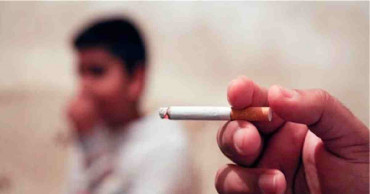PROGGA a
Tobacco products to become more affordable: Anti-tobacco platforms
In a quick reaction to the proposed national budget of 2021-22 fiscal year, two anti-tobacco platforms – PROGGA and Anti-Tobacco Media Alliance (ATMA) on Thursday claimed that tobacco products will become more affordable in the upcoming fiscal year.
The proposed budget has kept the prices unchanged for low-tier cigarettes which constitute around 72 percent of the cigarette market. The per capita income of the country, however, saw a 9 percent increase since last fiscal year, they said.
Also Read: National Budget: Progga, ATMA for hiking tobacco goods
The anti-tobacco platforms sent their reaction to the media after Finance Minister AHM Mustafa Kamal started unveiling the proposed budget in Parliament in the afternoon.
The proposed budget, if implemented, will considerably reduce the real prices of cigarettes and encourage the poor and the youth demographic to get hooked on the deadly addiction of smoking.
The same goes for bidi and smokeless tobacco (jarda and gul) where the taxes and prices have also been kept unchanged. This would put the low income people, particularly women, into greater health risk.
Also Read: Budget: Prices of tobacco products up, gold down
If the proposed budget is finally passed, tobacco companies will be the only beneficiaries and the government will lose revenue opportunities.
Such a budget will only encourage tobacco business and ignore hundreds of thousands of deaths, impairment, massive socioeconomic and environmental damage this industry causes, they said.
The proposed budget has kept the prices of and taxes on low and medium categories cigarettes unchanged. The prices for 10 sticks of high and premium tier cigarettes have been increased by only BDT 5 (5.2 percent hike) and BDT 7 (5.5 percent hike), setting the prices at Tk 102 and 135 respectively.
The existing 65 percent supplementary duty has been unchanged. This means the prices of per stick high and premium tier cigarettes will go up by only 50 paisa and 70 paisa respectively, which is a very negligible increase compared to the increase in per capita income.
On the contrary, due to faulty tax structure, tobacco companies will pocket a sizable portion of this increased price, and thus they will be encouraged in death trade, which is quite alarming.
However, if the government imposed tiered specific supplementary duty as demanded by anti-tobacco organizations, it would have generated additional revenues of BDT 3400 crores, which could have been used to deal with the losses related to coronavirus pandemic, said the platforms.
Bidi and smokeless tobacco (jarda and gul), known enemies to public health, have seen no change in their prices and taxes in the proposed budget. Considering the rise in per capita income, these harmful products will become more affordable.
This would undoubtedly put the low income people, particularly women, into greater health risk.
Currently, more than 50 percent of the country's 37.8 million adult tobacco users use smokeless tobacco products. It is concerning that despite such a large user base, revenues from smokeless tobacco items constitute less than 1 percent of total tobacco revenues.
The government has been losing opportunities of earning additional revenues from this sector. It is impossible to achieve a tobacco-free Bangladesh while giving tobacco companies free passes like this.
“The proposed budget does not reflect any proposals or suggestions from anti-tobacco organizations. The only thing it safeguards is tobacco companies' interests. Once implemented, it will make tobacco products more affordable and increase tobacco-related deaths and other losses. So, we urge the government to incorporate our price and tax proposals in the final budget, ”said PROGGA (Knowledge for Progress) Executive Director ABM Zubair in his reaction to the proposed budget.
Among others, the proposed budget keeps both the existing 45 percent corporate tax on all tobacco companies (cigs, bidis, SLTs) and 2.5 percent Surcharge on tobacco manufacturer's income unchanged.
According to WHO, smokers are more likely to get severely ill from covid-19 infection than non-smokers. Despite all such warnings, the proposed budget failed to make any effort to discourage use of tobacco products for its lack of effective price and tax measures which is utterly frustrating for anti-tobacco activists, they said.
4 years ago

